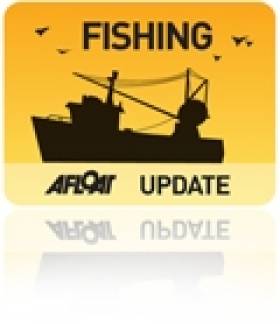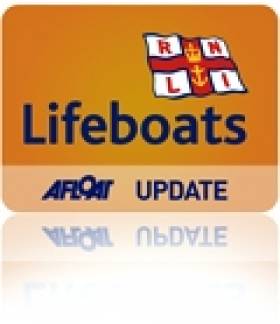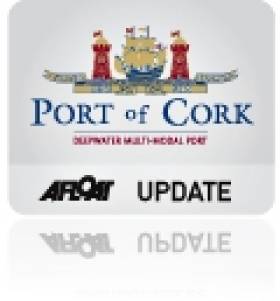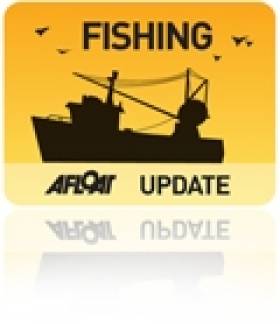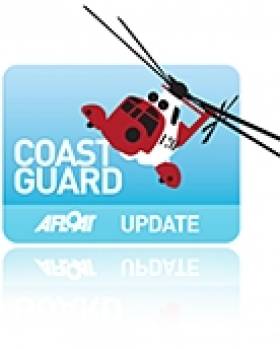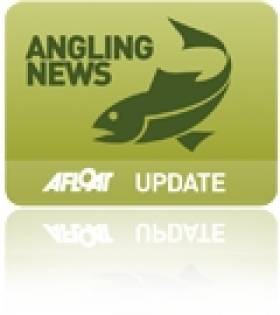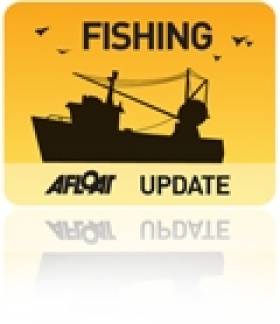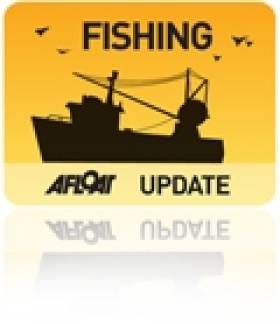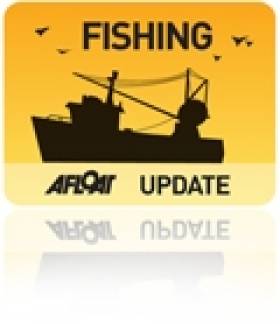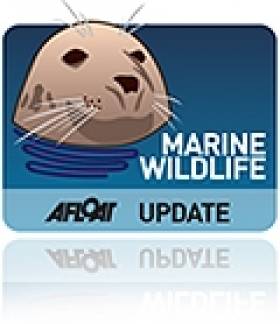Displaying items by tag: Fishing
#Fishing - Inland Fisheries Ireland (IFI) is inviting applications for Commercial Salmon Fishing (Draft Net & Snap Net) Licences for 2013.
The new licences are in accordance with the Control of Fishing for Salmon Order 2013, and come in the wake of the new Draft Nets and Snap Nets Bye-Law which sets out the relevant details for the current commercial fishing season.
An application form can be found within the downloadable PDF of said order, or may be obtained from your local IFI office. The closing date for receipt of completed applications is 29 March 2013. Late submissions cannot be accepted.
Arklow RNLI Aids Fishing Vessel Off Courtown
#RNLI - Arklow RNLI came to the assistance of three fishermen whose vessel got into difficulty off the Wexford coast yesterday (6 March).
The volunteer lifeboat crew was alerted shortly before 1.30pm following a report that a fishing vessel was adrift four miles east of Courtown Harbour.
The all-weather lifeboat, the Ger Tigchleaar, was launched within minutes and proceeded to the scene where the vessel, the MFV Telstar, had lost steering power.
Having located the casualty, the crew members established a tow and began the journey back to Arklow. All three crew members who remained on board the MFV Telstar were returned safely ashore.
Speaking ashore, the vessel’s skipper James Russell, himself an Arklow RNLI volunteer crew member and experienced seaman, paid tribute to his fellow lifeboat crew members Eamon Kavanagh, Matt Heaney, Scottie Heaney, Michael Fitzgerald, Andy Loughlin and David Lee who came to his crew’s assistance.
"I thought we were well prepared for situations which might happen at sea but knowing the lifeboat is there when needed is a great help," he said. "When anyone gets in to difficulty they should have no hesitation in calling for help as I did today."
Public Consultation On Future Of Bantry Bay Harbour
#IrishHarbours - The Department of Transport, Tourism and Sport (DTTAS) is asking members of the public and all interested parties for their views on plans to merge Bantry Bay Harbour with the Port of Cork Company.
The department believes that the future of Bantry Harbour would best be secured through a merger, and is seeking views on the proposals by 5 April.
Government policy is to merge harbours with significant commercial traffic with a port company, and to transfer smaller harbours to a local authority. To date 11 harbours have transferred to local authority control. Bantry Bay Harbour is now the only regional harbour operating under the Harbours Act of 1946.
A Review of Regional Ports and Harbours in 1999 recommended that Bantry Bay Harbour Authority should merge with the Port of Cork company, on the grounds of good governance.
The core business of Bantry Bay Harbour is the oil storage and transhipment terminal on Whiddy Island. Aquaculture, fishing and tourism are also prevalent in the harbour and a small number of cruise liners visit the harbour each year.
Amalgamation with the Port of Cork would provide access to port expertise, marketing, strategic development planning and the skills required for the regulation of navigation, ship and port security requirements, pilotage, safety, emergency response, and pollution.
The Port of Cork currently provides this professional expertise through the provision of harbourmaster services, on a contractual basis, to bring in large oil tankers and cruise liners into the bay. This is an absolute requirement to operate business in Whiddy to help mitigate the risks of maritime accidents and environmental damage.
Should the transfer take place to the Port of Cork, there is an opportunity for the port to provide local representation to Bantry Bay and some investment back into the harbour. The opportunity also exists for the Port of Cork and the local authority to co-operate with regard to the future development of the harbour.
Sea-Fisheries Protection Authority Meet with Newly Appointed Sea-Fisheries Protection Consultative Committee
#sfpa – The Sea-Fisheries Protection Authority (SFPA) will meet with the newly appointed Sea-Fisheries Protection Consultative Committee, today, Thursday 7th March at Agriculture House, Dublin. The 14 member Consultative Committee which consists of representatives from the Irish marine community, is appointed by the Minister for Agriculture, Food and Marine, under the provisions of the Sea Fisheries and Maritime Jurisdiction Act to liaise with SFPA on behalf of the sea-fisheries and seafood sectors. The previous Consultative Committee were particularly active in their regular meetings with the SFPA which is now reinvigorated following recent new appointments by the Minister for Agriculture, Food and the Marine, Mr Simon Coveney, TD, including a new Chairperson, Ms Gillian Mills. Today's meeting marks the first sitting of the new Consultative Committee.
Engagement between the SFPA and the Consultative Committee is a two-way process - the Consultative Committee's primary function as described in legislation is to inform the SFPA of the concerns and views of the sea-fisheries and seafood sectors regarding the functions of the SFPA and equally to facilitate the SFPA with communicating to the wider industry.
Part of the remit of the Committee is to also advise the SFPA on the fairness and consistency of its operations. The Consultative Committee will also keep the sea-fisheries and seafood sectors generally informed of the applicable sea-fisheries law and food safety law, as well as of the standards, guidelines, practices and procedures operated by the SFPA in relation to the enforcement of that law. Overall the Consultative Committee's function is to seek the delivery of a high standard of service by the SFPA.
Micheál O'Mahony, Board member with the SFPA said: "The SFPA can only achieve its goals through open dialogue with the sea-fisheries and seafood sectors. This Sea-Fisheries Protection Consultative Committee is a valuable forum through which we continue to share key information on how best to monitor the sea-fisheries and seafood sectors. We are delighted to see the reinvigoration of the role of the committee by the Minister, as various significant challenges are faced in the implementation of current and incoming legal obligations in these sectors.
I am sure this collaboration between the SFPA and the Consultative Committee will continue to help SFPA to work towards its service delivery and facilitate ongoing industry compliance. The SFPA and the industry share common goals, most notably the attainment of a vibrant, compliant seafood sector. We look forward to a fruitful exchange of information and ideas on how we can best work together to protect the interests of legitimate operators within the sea-fisheries and seafood sectors. I would also like to take this opportunity to thank Mr Tom Geoghegan for successfully taking on the role of acting Chair of the Consultative Committee - Mr Geoghegan remains on as Deputy Chair of the Consultative Committee."
UK Coastguard Agency Head Meets Fishermen's Mission in NI
#Coastguard - The chief executive of the UK's Maritime and Coastguard Agency (MCA) was in Northern Ireland yesterday (4 March) to discuss future collaboration with the Royal National Mission to Deep Sea Fishermen.
As Fishupdate.com reports, the charity - also known as the Fishermen's Mission - provides emergency support to fishermen and their families in times of need.
Sir Alan Massey of the MCA was in Kilkeel, Co Down to meet with the charity's CEO David Dickens to find out how best to work together on their common ground of safety at sea.
"We want to encourage a culture where it becomes normal practice for all fishermen to wear a lifejacket or personal flotation device (PFD) when out at sea," said Massey.
Dickens added that the Fishermen's Mission is "keen to engage with all agencies and organisations that seek to reduce the number and severity of incidents in fishing".
New Bylaws for Salmon and Trout Angling
#Angling - Six new bylaws of relevance to the angling community and the commercial fishing industry have been signed into law this week by Minister of State Fergus O'Dowd.
The Conservation of Sea Trout Bye-Law provides for a daily bag limit of three sea trout (less than 40cm in length and provides for the use of single barbless hooks and prohibits the use of worms as bait once the specified number of sea trout has been caught.
The Prohibition of Angling Methods Bye-Law prohibits the use of any fish hooks, other than single barbless hooks, and also prohibits the use of worms as bait in angling for all species of fish in the waterways specified.
The Conservation of Salmon and Sea Trout (Newport River) Bye-Law provides for catch and release in respect of Salmon and Sea Trout (over 40 cm) in the Newport River including the waters of Lough Beltra and the Crumpaun River, Co Mayo during the period 20 March to 11 May 2013.
The Conservation of Salmon and Sea Trout (River Nore) Bye-Law provides for catch and release in respect of Salmon and Sea Trout (over 40 cm) in the River Nore during the period 17 March to 11 May 2013.
The Conservation of Salmon and Sea Trout (River Slaney) Bye-Law extends the annual close season in angling for salmon, sea trout and brown trout in the River Slaney and its tributaries in the year 2013 from 26 February to 16 March and from 17 September to 30 September. The bylaw provides for catch and release during the period 17 March to 16 September in angling for salmon and sea trout. It also provides for the use of artificial fly only with single barbless hook upstream of the Old Bridge in Enniscorthy, and provides for single barbless hook and a ban on worms as bait downstream of the bridge when angling for salmon or sea trout.
Finally, the Draft Nets and Snap Nets Bye-Law sets out the opening and closing dates (and hours) for the draft net and snap net salmon and sea trout (salmon includes sea trout as defined in the Inland Fisheries Act 2010) commercial fishing season 2013 and prohibits draft net and snap net fishing for (salmon and sea trout) in all fishery districts except those mentioned in the schedule. It also prohibits the use of monofilament material in draft nets, with the exception of Cork Harbour and Castlemaine Harbour where monofilament material in draft nets is permitted.
Sean Kelly MEP: 'Support Fishermen in Implementing Fish Discards Ban'
#fishing – Sean Kelly MEP (Ireland South) has welcomed an agreement by EU Council Ministers to ban the practice by which fishermen discard or throw fish back into the sea when they exceed their quota. However, Mr Kelly stresses the need to ensure fishermen are supported throughout the ban's implementation.
"While the wasteful practice of discarding fish had to be banned, I welcome the fact that the ban will be introduced on a phased basis, allowing fishermen the chance to amend their methods of work," Mr Kelly said in Brussels today.
The ban will begin in January 2014 for pelagic stocks, surface fish such as mackerel and herring, moving onto the Baltic Sea by January 2015. Main demersal stocks such as hake and monkfish in the North Sea and the North and South Western waters will be covered by the ban from January 2016. In the last phase of the ban, the new rules will apply to fisheries in the Mediterranean, the Black Sea and all other Union waters on January 1st, 2017.
"This is an issue I have regularly raised at an EU level. I am keen to ensure that fishermen are supported in the transitioning period - so we need to see the details of a planned fund to help protect the livelihoods of fishermen as they change practices and begin to land what fish is caught. New equipment to improve the quality of the catch and help identify the type of fish will also be introduced."
Mr Kelly also repeated his concerns over the practices of Dutch-owned fishing vessels of the South West coast. There are allegations of illegal dumping at sea by these vessels which are only declaring what they land at port and not what is actually caught. Their ships are also understood to be equipped with 'mincers' which enables them to engage in what is called 'high grading' or picking out the smaller sized less valuable fish, mincing them and dumping them.
Mr Kelly understands that around 25-40 Dutch factory ships operate off Ireland and are owned or controlled by Dutch companies but not necessarily registered under the Dutch flag.
"We have to protect our valuable marine resources and protect the livelihood of Irish fishermen who are being driven out of business by the illegal and immoral practice of other fleets," Mr Kelly concluded.
Minister for Marine Coveney Brokers New European Fishing Deal
#fishing – Minister for Agriculture, Food and Marine, Simon Coveney T.D following a long and tense set of negotiations brokered political agreement at today's Council of Fisheries Ministers for the introduction of a Europe wide discards ban.
The decision made by the Council of Ministers in Brussels is a very important decision for the future of European fisheries and is a clear expression of the will of the Council to consign to history the current discard practices in European fisheries. The decision is also important in that it will allow the Irish Presidency, on behalf of the Council, to engage directly with the European Parliament and Commission with a view to reaching political agreement on the reformed Common Fisheries Policy during the Irish Presidency.
Minister Coveney said "I have been a strong advocate for the elimination of the wasteful practice of discards over many years, to my mind today's decision by the Council of Ministers is a historic milestone in European Fisheries Policy"
Balancing divergent Member States views with the need to deliver practical and implementable measures to facilitate agreement on the early introduction of a discard ban in all the waters under the jurisdiction of the EU was always going to be a difficult challenge.Discarding is a highly complex issue and occurs in almost every fishery, in every area and across most fleets in the European Union. Every Member State operating fishing operations on the open sea has a discard problem. Many Member States have significant levels of discards in certain fisheries, and for varying reasons.
The Minister went on to say " The discarding issue was always going to be contentious and resolving it difficult ,not that there was any disagreement on the overall objective, but because there were divergent views on the associated management tools needed to make a discard ban a reality in practice"
In Brussels today, Minister Coveney secured agreement for an ambitious phased approach to introducing the discard ban. Starting in January 2014 for pelagic stocks moving onto the Baltic Sea in January 2015. The discard ban will apply to the main demersal stocks in the North Sea and the North and South Western waters from January 2016. Finally the discard ban will apply to fisheries in the Mediterranean, the Black Sea and all other Union waters on 1st January 2017.
On the details of the measure the Minister said "We have set an ambitious timeframe starting in January 2014, for introducing the discard ban underpinned by specific management tools to ensure its delivery."
Putting an end to discards is a key objective in the reform of the CFP supported by all Member States. A very important element in delivering on this objective will be the introduction across all fisheries of smarter and more selective fishing gear selectivity measures and changed fishing practices that avoid to the greatest extent unwanted catches particularly those of juvenile fish.
The Minister paid tribute to his Ministerial colleagues by adding "I have to thank my Ministerial colleagues for their co-operation, help and stamina in agreeing this very ambitious programme for change. I would also like to mention the contribution I have received from Commissioner Damanaki throughout the whole process"
The practical measures agreed today, will assist fishermen in the transition to the new environment. These measures provide transitional arrangements to support the change over to the new landing obligation. They also provide flexibility in terms of maximising quota options so that fisheries will not be closed unnecessarily The new EU fisheries fund will be available to support fishermen with the move to more selective and sustainable fishing practices.
Concluding the Minister added "It has been a long day and night, but a fruitful one. We can look forward to the completion of reform of the Common Fisheries Policy with confidence, in the knowledge that we have taken a major step to secure the long term sustainability of the stocks in European waters.
Ending Fish Discards Requires New Technologies - Damanaki
#Fishing - Key to proposals to end fish discards in this year's reform of the Common Fisheries Policy (CFP) is the introduction of new technology like wheelhouse cameras and 'smart nets'.
So argues EU Fisheries Commissioner Maria Damanaki, as BBC News reports on trials of new net designs that can separate fish catches and reduce damage to the seabed.
One of the fishing net innovations involves a bendable plastic grid attached to the middle of a trawl net that allows smaller fish and juveniles to pass through while snaring the valuable larger catch.
Another design, the Rollerball net, attempts to eliminate the problem of heavy trawling gear churning up debris on the sea floor while reducing drag and saving on boats' fuel bills.
Assuaging concerns over the prohibitive costs for fishermen, Damanaki says she hopes that such 'smart nets' will be subsidised by as much as 85% - while emphasising that the adoption of new technology could mean the difference between being allowed to fish or being banned from the ocean.
Wheelhouse CCTV cameras are another method that has been shown to reduce discards to less than 1% in some cases - and Damanaki says they will be essential if the CFP reforms indeed include a zero tolerance policy on fish discards.
BBC News has much more on the story HERE.
West Cork Weekends Will Bring You Closer To Marine Wildlife
#MarineWildlife - If you've ever wanted to get closer to Ireland's marine wildlife, a new series of weekend excursions in West Cork may be just the ticket.
The Southern Star reports on the 'Discover Wildlife Weekends' being run from Rosscarbery by local company Ireland's Wildlife starting this April, where those taking part will be led by expert guides to explore the coastal region and have the best opportunities to spot the many species of whales and dolphins that visit our shores.
Weather permitting, the weekends will also involve some offshore whale watching in the company of 'whale watch supremo' Colin Barnes and the Irish Whale and Dolphin Group's (IWDG) sightings co-ordinator Pádraig Whooley.
And birdwatching will also be a feature, as West Cork is a hotspot for our feathered friends - from merlins and peregrine falcons to coastal waders and more exotic fowl that skirt our coasts on their spring migrations.
The Southern Star has much more on the story HERE.
Meanwhile, marine sector stakeholders have expressed their concerns over the designation of six new offshore marine areas by the National Parks and Wildlife Service.
As previously reported on Afloat.ie, the six sites at Blackwater Bank in Wexford, the West Connacht coast, Hempton's Turbot Bank in Donegal, the Porcupine Bank Canyon off Kerry, the South-East Rockall Bank, and the stretch from Rockabill to Dalkey Island off Dublin have been proposed for designation as Special Areas of Conservation (SACs) to protect marine habitats and species listed on the 1992 EU Habitats Directive.
But at a recent meeting at the Irish Farm Centre in Dublin, a coalition of fish farmers, fishermen and marine energy stakeholders have hit out at what they characterise as "the appalling handling of inshore designations since the 1990s by the State", which they claim "has resulted in hundreds of job losses and a flight of serious investment" from Ireland's coastal areas.
“Our experience of the Irish Government’s application of the EU Habitats Directive has been a saga of mismanagement, foot dragging and buck-passing which has left over 500 fish farming licences in limbo for over 10 years and a backlog of red tape and bureaucracy which could see producers waiting until 2020 and beyond for simple renewals which are vital to underpin their businesses," said IFA aquaculture executive Richie Flynn.
"These new offshore SACs will have the same effect of preventing any fishing, marine energy or aquaculture being carried out in these areas if left in the hands of the same agencies to manage."



























